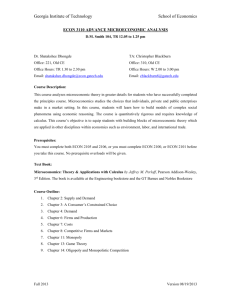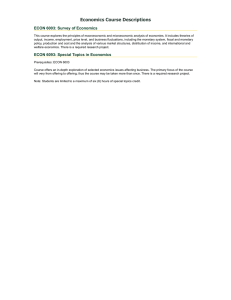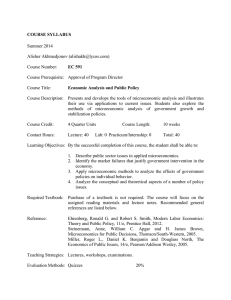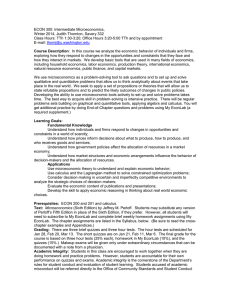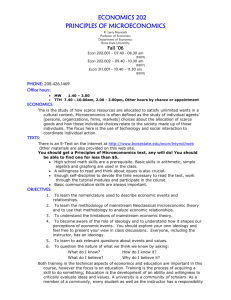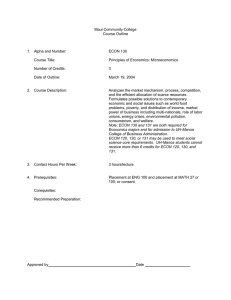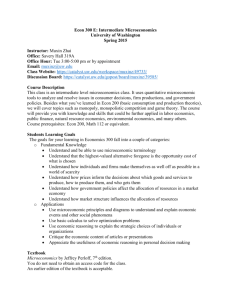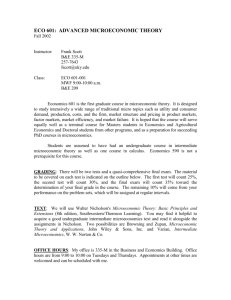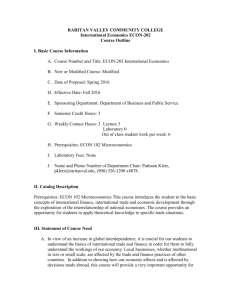Econ 300 B: Intermediate Microeconomics University of Washington
advertisement
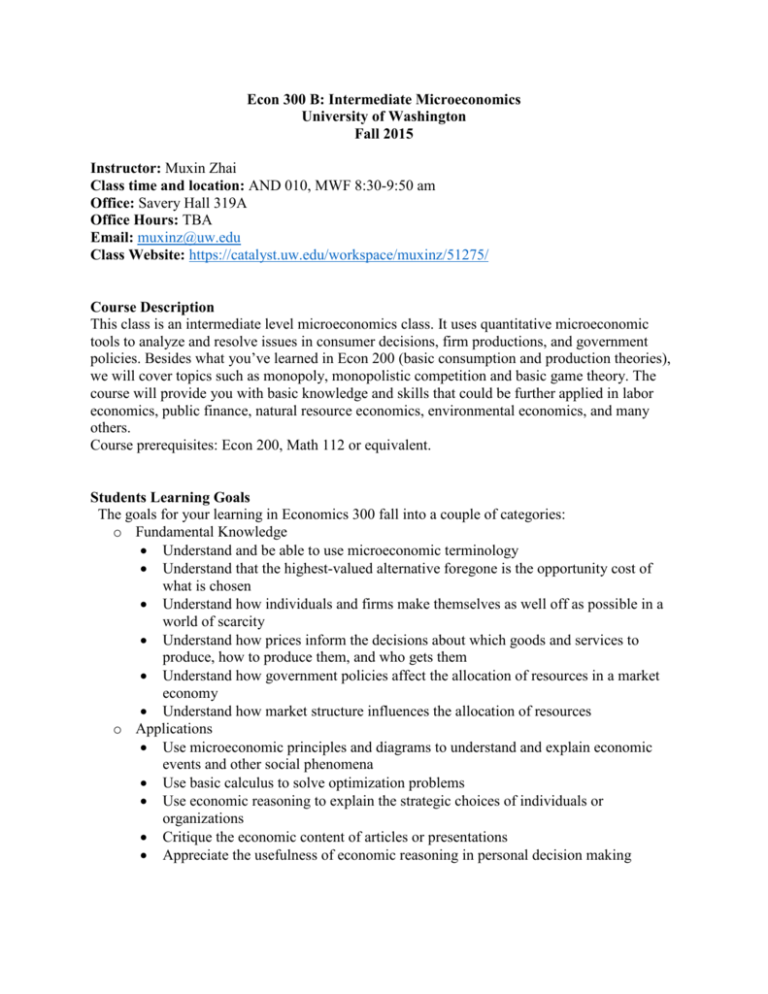
Econ 300 B: Intermediate Microeconomics University of Washington Fall 2015 Instructor: Muxin Zhai Class time and location: AND 010, MWF 8:30-9:50 am Office: Savery Hall 319A Office Hours: TBA Email: muxinz@uw.edu Class Website: https://catalyst.uw.edu/workspace/muxinz/51275/ Course Description This class is an intermediate level microeconomics class. It uses quantitative microeconomic tools to analyze and resolve issues in consumer decisions, firm productions, and government policies. Besides what you’ve learned in Econ 200 (basic consumption and production theories), we will cover topics such as monopoly, monopolistic competition and basic game theory. The course will provide you with basic knowledge and skills that could be further applied in labor economics, public finance, natural resource economics, environmental economics, and many others. Course prerequisites: Econ 200, Math 112 or equivalent. Students Learning Goals The goals for your learning in Economics 300 fall into a couple of categories: o Fundamental Knowledge • Understand and be able to use microeconomic terminology • Understand that the highest-valued alternative foregone is the opportunity cost of what is chosen • Understand how individuals and firms make themselves as well off as possible in a world of scarcity • Understand how prices inform the decisions about which goods and services to produce, how to produce them, and who gets them • Understand how government policies affect the allocation of resources in a market economy • Understand how market structure influences the allocation of resources o Applications • Use microeconomic principles and diagrams to understand and explain economic events and other social phenomena • Use basic calculus to solve optimization problems • Use economic reasoning to explain the strategic choices of individuals or organizations • Critique the economic content of articles or presentations • Appreciate the usefulness of economic reasoning in personal decision making Textbook Microeconomics by Jeffrey Perloff, 7th edition. You do not need to obtain an access code for the class. An earlier edition of the textbook is acceptable. Grades Practice problem set o There will be weekly problem sets for you to review the class materials and practice. o You do not have to turn in your answers to the problem sets. o Answer keys will be provided. Three exams: 30% each o Each exam consists of 4-5 short answer questions. You may use a non-graphic calculator, but no graphic calculator or cell phone will be allowed. o The exams will be non-cumulative. o There is no make-up exam. If you have to miss an exam due to medical reasons, please come and talk to me. Class participation: 10% o We will have a number of in-class discussions and group works. Participation into these activities will deepen your understanding of class materials. Note:The Department of Economics determines the median grade of Econ 300 should be 2.9 to 3.1. A natural grade distribution will follow from the percentage score out of 100 to a 4.0 scale. Course Tentative Schedule Week 1 9/30 – 10/2 Week 2 10/5 – 10/9 Week 3 10/12 – 10/16 Week 4 10/19 – 10/23 Week 5 10/26 – 10/30 Week 6 11/2 – 11/6 Week 7 11/9 – 11/13 Week 8 11/16 – 11/20 Math Review Chapter 1: 1.1-1.2 Chapter 2: 2.1-2.5 Supply and demand Chapter 3: 3.1-3.4 Applying the supply and demand model Chapter 4: 4.1-4.4 Consumer choice Chapter 5: 5.1-5.5 Applying consumer theory Chapter 6: 6.1-6.5 Firms and production Chapter 7: 7.1-7.4 Costs Chapter 8: 8.1-8.4 Competitive firms and markets Chapter 9: 9.1-9.4, 9.6 Applying competitive model PS0: math review PS1 PS2 Friday: Exam I PS3 PS4 PS5 No class on Wed Friday: Exam II Week 9 Chapter 11: 11.1-11.5 PS6 11/23 – 11/27 Monopoly No class on Friday Week 10 Chapter 14: 14.1-14.3 PS7 11/30 – 12/4 Game theory Week 11 Chapter 13: 13.1-13.4 Friday: Exam III 12/7 – 12/11 Cournot duopoly Note: Actual pace of the class might be slightly different from the schedule. Please refer to our class website for announcement on changes in schedule.

